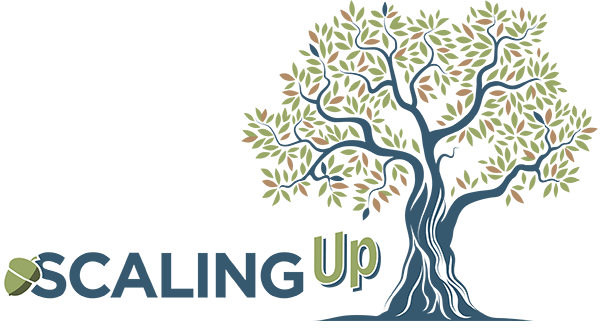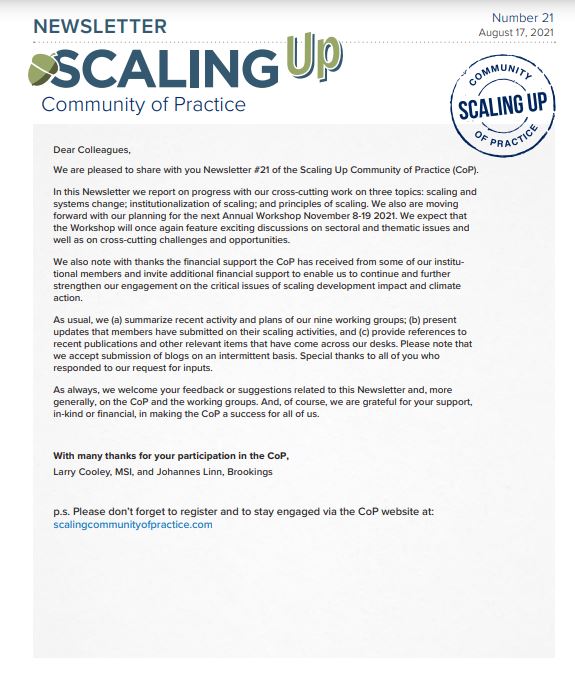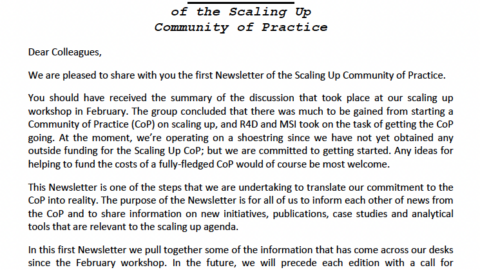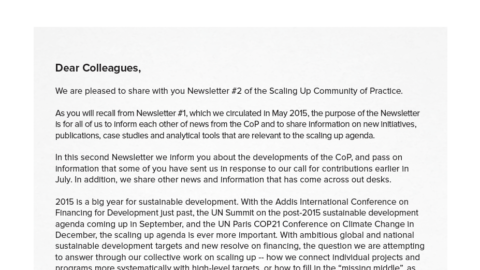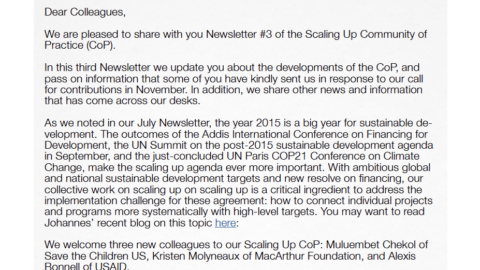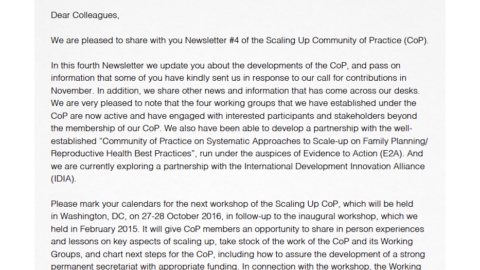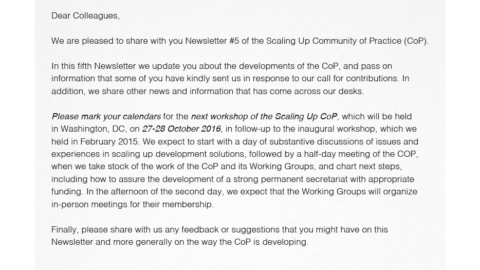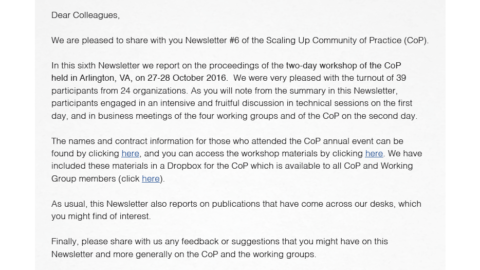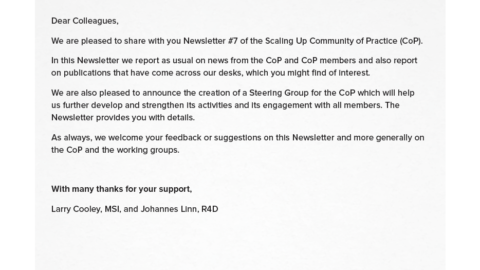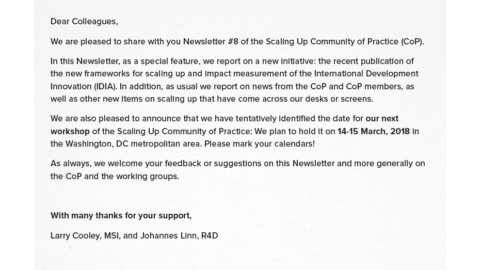News from the Scaling Up Community of Practice
Crosscutting issues
As was reported in Newsletter #20, the Executive Committee (ExCom) decided to commission thought products and convene discussions on selected issues that cut across the sectoral and thematic areas covered by our nine Working Groups. Based on a list of crosscutting issues identified in Richard Kohl’s working paper and the blog by Larry Cooley, Richard Kohl and Johannes Linn, the ExCom decided to pursue three issues:
- Scaling and systems change: A subgroup of the ExCom (consisting of Larry Cooley, Laura Ghiron, Isabel Guerrero, Johannes Linn, Ruth Simmons, Sabrina Strom, Liz Vance and Lennart Woltering) is leading this work. The subgroup organized a webinar on 25 May 2021 on the topic: “Scaling and Systems Change: Chicken and Egg”, exploring the links and complementarities between the scaling and systems change perspectives of achieving transformative impact at scale. The discussion drew on Richard Kohl’s issues paper on that topic. The paper and a link to the discussion can be found here. The subgroup will organize additional webinars in the coming months.
- Institutionalization of scaling: The M&E Working Group is undertaking a series of 5 virtual events focused on methods for monitoring and evaluating the extent to which new initiatives are effectively institutionalized, with special focus on interventions that aspire to scale through government and other national systems. The sessions will examine cases of large-scale interventions in education and health, with the intention of identifying lessons that span sectoral divisions. The first webinar was held in June and the second in early August, with PowerPoint and recordings available via the CoP website. Future sessions, planned for September and October, will also be advertised on the website, and the workstream will be featured in a plenary session during the CoP’s annual workshop in November.
- Principles of scaling: The ExCom decided to embark on an effort to distill key principles for effective scaling from literature and practice. These principles would serve as basic, high-level guidance for scaling, drawing on the lessons from the vast experience of CoP members. A subgroup (consisting of Larry Cooley, Laura Ghiron, Julie Howard, Hisham Jabi, Johannes Linn and Sabrina Storm) is leading this work. Richard Kohl has been commissioned to work together with Johannes Linn on preparing a background paper for discussion at the next Annual Workshop of the CoP. Based on the background paper and feedback from the CoP members, the ExCom hopes to adopt a set of principles to be published on the CoP Website in early 2022.
Next CoP Annual Workshop
With the pandemic still not under control in many parts of the world, we expect to organize the next Annual Workshop again as a virtual event presented in a modular format during the two weeks of 8-19 November. Depending on the status of the pandemic, a one day in-person event may also be scheduled during this period at the offices of Management Systems International (MSI) in Arlington, VA, USA.
Posting of knowledge products on the CoP website
Members are invited to submit their knowledge products (blogs, working papers, etc.) for posting or reposting. Larry Cooley and Johannes Linn will provide editorial review and guidance for any knowledge products submitted for publication on the general resource page of the website. WG chairs will serve in the editorial capacity for knowledge products and news items to be posted on the WG pages. The CoP Newsletter will no longer publish blogs. Note: All knowledge products to be posted should meet the following criteria: (i) focus on scaling issues, approaches or tools; (ii) report on lessons and implications of scaling experience; (iii) blogs should have 800-1000 words.
Registration on the CoP website
With the CoP Website now active, all members are strongly encouraged to register on the website and to visit the website from time to time to stay apprised of upcoming activities. We will increasingly rely on the website to disseminate materials and to keep everyone informed.
Financial support for the CoP
The CoP depends on the financial support of its members for its effective functioning. The generous support of the following institutions for the years 2019-21 is gratefully acknowledged:
- GiZ
- Eleanor Crook Foundation o MacArthur Foundation/Lever for Change o MasterCard Foundation o Bill and Melinda Gates Foundation o Management Systems International o ExpandNet
During the coming months, the ExCom will seek to mobilize financial support for the next two-three years and welcomes any ideas – or, better yet, contributions – from its members. The contributions allow the CoP to fund its administrative expenses, the management of the website, the expenses connected with the annual workshop, and the commissioning of selected expert knowledge products. Please contact Larry or Johannes with any funding ideas you might have.
Newsletter submission
For this Newsletter, we used a new method for submitting member information, employing a special web tool rather than e-mail submission. From our perspective this worked well and we plan to use it for future newsletters. Please let us know if there were any glitches that you encountered as you submitted your information so we can ensure a smooth process next time.
Working Groups of the Scaling Up Community of Practice
The CoP hosts nine working groups (WGs). Their recent and currently planned activities are listed below, together with the names and e-mail addresses of the chairpersons. For more information on each working group and on how to join and contribute to a working group, please visit the CoP Website (www.scalingcommunityofpractice.com) or contact the respective chairperson(s). You can also reach out to Larry (LCooley@msi-inc.com) or Johannes (jlinn@brookings.edu). The nutrition working group is currently in the process of reorganization. Relevant news on its activities will be shared in the next newsletter.
Agriculture and rural development (ARD) Working Group
Mark Huisinga (USAID) mhuisinga@usaid.gov
Frank Place (IFPRI) F.Place@cgiar.org
Lennart Woltering (CIMMYT) L.Woltering@cgiar.org
The Agriculture and Rural Development (ARD) working group (WG) organized a follow up meeting on the interface of Scaling and Systems Change (SSC) focusing on examples from agriculture in Africa where scaling and systems change are coming together. Speakers were Gloria Otiene, associate scientist of Alliance Of Biodiversity International and CIAT, and Mulemia Maina, managing director of Agri Experience Ltd. During the webinar, the group looked at how strengthening African seed systems facilitated the scaling of improved seed varieties and why this has worked better in some countries and crops than others.
Climate Change Working Group
George Zedginize (Green Climate Fund) gzedginidze@gcfund.org
Amar Bhattacharya (Brookings) ABhattacharya@brookings.edu
The Climate Change Working Group is planning a webinar on scaling climate solutions through global action to be held in September, and a session on the Green Climate Fund’s approach to scaling in November in connection with the CoP’s Annual Workshop.
Education Working Group
Jenny Perlman Robinson (Brookings) jperlman@brookings.edu
Gaelle Simon (MSI) gsimon@msi-inc.com
On March 25, the Scaling Up Community of Practice Education Working Group held its first webinar of 2021, presenting the newly developed Education Scalability Checklist. The checklist is based on an existing tool developed by MSI and adapted to education through a process led by VVOB – Education for Development, in collaboration with the Center for Universal Education at Brookings, Educate!, MSI, Pratham, and STiR Education. The Education Scalability Checklist is a diagnostic tool to determine the ease of scaling a particular education initiative as well as to identify areas where further consideration and adaptation are required in order to increase the likelihood of scaling. The slides and webinar recording can be accessed on the Scaling Up Community of Practice website. The working group co-chairs will be planning for the next webinar in the coming months. Please do not hesitate to reach out to them if you are interested in sharing on an upcoming webinar, particularly around your organization’s experiences and lessons learned about scaling during the pandemic.
Fragile States Working Group
Jonathan Papoulidis (World Vision) jpapouli@worldvision.org
Robert S Chase (World Bank) rchase@worldbank.org
The working group hosted a discussion on June 25th led by two of its members from the OECD, Harsh Desai and Jonathan Marley, on the OECD’s States of Fragility Framework, including on 1) the conceptual basis and understanding of fragility; 2) the classification of fragility applied by the framework; 3) the methodology and indicators that inform and shape the framework’s multidimensional structure; and 4) the potential applications of the Framework for scaling-up in fragile contexts. A recording will soon be available to CoP members on the website. If sharing on twitter, please tag the CoP’s handle @ScalingUpCoP.
The working group’s scope of work involves: (a) applying scaling up approaches to bridge humanitarian and development interventions; (b) elaborating on the obstacles to scaling in fragile states and how they have been overcome, or when scaling should not have been attempted; (c) promoting adaptive, resilient and politically-smart methods for scaling; and (d) examining ways to strengthen country institutions and mobilize private sector finance for sustainable scaling in a range of fragile contexts.
The group’s next meeting will take place in September. If WG colleagues would like to present on their work and its implications for scaling in fragile states, or to invite their partners/collaborators to present, please contact Rob and Jonathan.
Health Working Group
Laura J. Ghiron (ExpandNet and the Evidence to Action Project) ljghiron@umich.edu
The Health Technical Working group (HTWG) is continuing the process of expanding its current membership to incorporate scaling actors and champions from a wide range of global health technical areas. If you have colleagues working on scale up issues under the focal areas of malaria, HIV, tuberculosis and other infectious diseases; chronic diseases; malnutrition; reproductive, child and maternal health; water, sanitation and hygiene; social norms and other health determinants; or any other health-related topic, please encourage them to join the Health Technical Working Group by visiting the www.scalingcommunityofpractice.com website and sign up or submitting their sign-up request directly to Laura Ghiron at laura.ghiron@expandnet.net.
The Health WG co-sponsored a webinar with the M&E Working Group on August 12th that features guest speakers from Last Mile Health and Living Goods. The focus of the webinar was on considering how different organizations involved in scaling monitor and evaluate the process of institutionalizing a program inside a government or other national system.
Monitoring and Evaluation (M&E) Working Group
Larry Cooley (MSI) LCooley@msi-inc.com
John Floretta (J-PAL) jfloretta@povertyactionlab.org
The M&E Working Group held a virtual meeting on June 3rd focused on monitoring and evaluating the institutionalization of programs and processes delivered through government systems. The first of four planned sessions on this topic, the June 3rd event focused on institutionalization of evidence-based education programs initiated by NGOs in Africa. It featured presentations by Meghan Mahoney, Director of Monitoring and Evaluation at Educate!, highlighting Educate!’s experience tracking the scaling and institutionalization of a skills-based education model in Rwanda and the sustainability framework used to guide this M&E work; and by Noam Angrist and Moitshepi Matsheng, co-founders of Young1ove, sharing their experience working very closely with the Ministry of Education in Botswana to scale the Teaching at the Right Level approach and assessing its institutionalization within government systems. The session was co-sponsored by the CoP’s Working Group on Education.
The second session on monitoring and evaluation of scaling through government systems was on August 12th and focused on the health sector and will feature the experience of Last Mile Health and Living Goods (see description above under Health Working Group). Sessions 3 of this series, to be held in September, will feature donor perspectives on monitoring and evaluation the institutionalization of interventions in the health and education sectors; and session 4, in October, will focus on host government perspectives. This stream of work will be summarized and assessed as part of the CoP Annual Workshop in November.
Social Enterprise Scaling Up Working Group
Isabel Guerrero (IMAGO) iguerrero@imagogg.org
Elaine Tinsley (World Bank) etinsley@worldbank.org
On May 20th, the SE WG held a webinar on Developing National Social Enterprise Ecosystems: Cases of Brazil & Turkey, offered in collaboration with the Social Entrepreneurship Community of Practice in Turkey (SECoP Turkey). The session’s video is posted in our SE Scaling UP website, where you will also find recordings from the previous sessions. The webinar provided a chance to see how Brazil and Turkey built up their SE ecosystem, as well as reflections from how the Jamaica experience compared with these countries. After the summer break, the group plans to kick off another round of webinars and will keep you posted. They welcome any ideas and suggestions, which can be sent to Elaine (etinsley@worldbank.org).
Youth Employment Working Group
Elizabeth Vance (International Youth Foundation, IYF) e.vance@iyfnet.org
Hisham Jabi (Consultant, World Bank) hishamjabi@gmail.com
Jessica Ngo (MSI) jngo@msi-inc.com
The Youth Employment Working Group hosted a webinar in June on the role of the public sector in scaling youth employment interventions and a session in July on the effect of labor market disruptions. Recordings and other materials are available via the CoP website. In the June session, Helene Cyr from EDC focused particular attention on the use of cost analysis to expand employability and entrepreneurship programs at the national level, illustrated by experience in Rwanda and Senegal.
In the July session, Shalini Dwivedi from Generation and Kristina Morzan from FHI 360 highlighted examples of innovative and impactful pivots of youth employment in response to the pandemic focusing on the transition from in-person to online interventions.
On September 1, the group will host a session featuring Diana Warira of J-PAL who will describe the Gender and Economic Agency Initiative (GEA) with particular attention to the addressing evidence gaps related to the factors that influence women’s engagement in the workforce.
Member News (in alphabetical order)
Brookings Center of Universal Education (CUE) (Education)
“When pilot studies aren’t enough: Using data to promote innovations at scale.” By Brad Olsen and Gustavo Arcia. Blog. 2021.
This blog post examines some of the inherent biases and limitations in piloting an innovation that can misrepresent the innovation at scale, including the Hawthorne Effect and the Rosenthal Effect, and considers lessons for implementers and researchers.
“How do government decisionmakers identify and adopt innovations for scale?” By Brad Olsen and Patrick Hannahan. Blog.
This blog synthesizes the authors’ review of existing evidence on how government decisionmakers decide to support and scale an innovation, finding scant research exists and even less in the field of education. What the research revealed is that governmental decision-making about scaling is neither linear nor purely rational. Instead, it’s a three-dimensional zigzag in which technical and financial features of an innovation interact with personal relationships, political incentives, and competing innovations.
“A year later: Reflections on learning, adapting, and scaling education interventions during COVID19.” By Tendekai Mukoyi, Molly Curtiss Wyss and Jenny Robinson. 2021.
One year into the COVID-19 pandemic, this blog reflects on how the past year has put to the test scaling principles and elucidated important lessons about catalyzing and sustaining transformative change in rapidly evolving contexts, sharing experiences from the case of Young1ove in Botswana.
“Minding the gap: The disconnect between government bureaucracies and cultures of innovation in scaling.” By Brad Olsen. Blog. 2021.
This blog discusses the contradiction between the government mechanics of adopting innovations and the culture of implementing them, which often becomes a central barrier to education innovations being adopted at scale.
“Putting scaling principles into practice: Resources to expand and sustain impact in education.” By Jenny Perlman Robinson, Molly Curtiss Wyss, and Patrick Hannahan. Report on a series of blogs. 7 July 2021
To provide concrete guidance based on key scaling principles and respond to gaps identified through its Real-time Scaling Labs, the Center for Universal Education at Brookings has developed four scalingrelated tools in collaboration with lab partners and other colleagues. Based on empirical research, these resources are designed to foster an iterative, reflective, and data-driven scaling process, with each tool supporting different phases of the scaling journey.
Contact: Molly Curtiss Wyss (mcurtiss@brookings.edu)
CIMMYT (Agriculture)
“The Scaling Scan: A practical tool to determine the strengths and weaknesses of your scaling ambition 2nd Edition.” by Lennart Woltering, Jan Ubles, Floortje Jacobs and Maria Boa Alvarado
Scaling aims to increase the use of innovations (new technologies or practices) to impact many people. At the same time, scaling should also lead to a sustainable system change in which the impact remains, or even accelerates, without further special project or donor interventions. Successful scaling of innovations requires that at least as much attention is paid to the complementary non-technological requirements. These non-technical requirements form the basis for the Scaling Scan, which is built around 10 “Scaling Ingredients” that each require attention to reach a scaling ambition.
Contact: Lennart Woltering (l.woltering@cgiar.org)
How can we better understand the root causes of the development problems we see around us? Take a deep dive with experts from the International Maize and Wheat Improvement Center (CIMMYT) and Raíces El Salvador to learn why systems change is the key to scaling innovations and solving development challenges. If we aim for sustainable systems, we must embrace complexity — not ignore it. If we analyze the root causes of problematic events we observe, we can understand what it takes for a better system to emerge. The authors explain an example from Central America showing that transformational systems change is possible if the deepest levels of persistent development challenges are addressed: https://bit.ly/3xIDC2z.
Contact: María Boa (m.boa@cgiar.org)
Co-Impact (General)
Launch of a new Gender Fund to transform systems to be more just and inclusive, advance women’s power, agency and leadership at all levels and shift harmful gender norms that prevent progress.
Launching at the end of the year, Co-Impact’s new Fund aims to raise and deploy US $1 billion over the next decade to support predominantly women-led Global South organizations with the large, unrestricted, long-term, and flexible funding needed to transform systems to be more just and inclusive, advance women’s power, agency and leadership at all levels, and shift harmful gender norms that prevent progress. Co-Impact’s ambition is that in 10 years:
- More than 100 million people will have better healthcare, quality education, and opportunity to work and thrive – regardless of gender, ethnicity, caste, or race.
- There will be more women leading at all levels from the household and community to institutions and government, influencing decisions that affect their communities and society.
- Perceptions and norms about women’s roles will be challenged and shifted.
- A report on the findings from our year-long consultation process with the gender community can be found here.
What are we learning about how to achieve gender equality, at scale? By Co-Impact. Blog. No date.
Co-Impact commissioned a series of papers on key areas of interest in the Gender Fund: what works to achieve gender-equitable outcomes at scale, in the Global South, in health, education, and economic opportunity; as well as what works to promote women’s leadership in law and economics. Co-Impact is complementing these reviews with a wider scope of readings and evidence, and looks forward to continuous learning from a range of disciplines and approaches.
Evidence reviews commissioned by Co-Impact:
- What works for low–income working women – Rekha Mehra
- Girls’ education at scale – David Evans, Amina Mendez Acosta, and Fei Yuan
- Women’s professional leadership in law and economics – Alex Berryhill and Lorena Fuentes
- What works for gender and health in the Global South – Anju Malhotra Three selected additional readings:
- On what works to enhance women’s agency
- On effectiveness of women’s movements
- On support for feminist organizations
Contact: Varja Lipovsek (varja@co-impact.org)
CRS (agriculture, child care)
Cracking the Nut Conference. CRS is leading a session for the upcoming Cracking the Nut Conference
(Nov 15-18) as part of the “Applying Technology and Digital Solutions” theme. The session, entitled “Call, Text or Share for Healthy Soil in Central America,” will present an integrated communications campaign designed to provide farmers with timely information about agriculture techniques as part of the Water Smart Agriculture (WSA) program’s extension, outreach and scaling strategy. The intended outcome of this session will be an increased understanding of how to effectively leverage communication platforms for awareness building, peer-to-peer learning, personalized farmer support, and scaling. Participants will learn how to design, implement and evaluate a cost-effective, integrated communications campaign to effectively leverage investments in communications for achieving programming objectives, scale, and systems change. Presenters include Katlyn Holland, CRS, Margarita Marroquin, CRS, Pedro Menjivar, Mayor of Valladolid, Honduras, Ericka Dubon, CRS, and Graciela Leal, PCI Media.
Contact: Sarah Page (sarah.page@crs.org)
“Public Expenditure for Child Care Reform: How to use influence to reach scale.”By Beth Bradford and Erica DahlBredine. Blog. 7 April 2021
To scale up the capacity of national family care and social protection systems, adequate levels of public investment must be re-directed to the systems and services that are critical to such systems. To support this endeavor, Changing the Way We Care* is publishing “Public Expenditure and Children’s Care” designed to strengthen the capacity of government agencies in low resource settings to prepare a sound budgetary framework for policies, programs, and services that aim to keep children in safe and nurturing family environments. The guidance is primarily for the government body that would lead on child protection. To be successful in increasing public budgets, that body must be able to make the investment case to a broader set of government sectors such as the finance ministry, social protection, health, education, justice, etc. As such, the guidance further outlines a methodology for making the investment case to the broader government, development partners and external donors for a familyfocused care and child and social protection system.
Contact: Kristie Inman (Kristie.Inman@crs.org)
Educate! (Education, youth employment)
Hard skills or soft skills for the youth?By Markus Goldstein. World Bank Blogs. 2 June 2021.
In this blog, the author (Africa Lead Economist and head of the Gender Innovation Lab at the World Bank) reviews the evidence for hard and soft skills for youth from a newly published study of a miniMBA youth skills program, which included Educate!’s soft skills curriculum. The experiment concluded that both hard and soft skill development models were effective in generating positive long term economic outcomes, and that the soft skill curriculum that Educate! designed led to higher profits and better jobs. So, what’s the bottom line — $73 per month for the hard skills and $68 per month in the soft skills.
Contact: Cate Daniels (cate@experienceeducate.org)
Education Development Center (EDC) (Education, youth employment)
“Scaling Youth Workforce Development Outcomes by Transforming Local Systems: A Rwanda Case Study.” By EDC. May 2021.
This case study from Rwanda explores the key components that drive improvements in youth skills and employment—equitably and at scale. To guide its analysis, the study uses the Youth Systems
Framework, a tool developed by the Youth Systems CollaborativeSM, which is a network of international organizations committed to knowledge-sharing around youth systems change in low- and middleincome countries. As a member of the Youth Systems Collaborative, EDC conducted this research to understand how shifts in Rwanda’s workforce development system occurred over a 10-year period. It also explores the role that EDC’s programming played in that change process and considers the role of donor-funded programs in international workforce development.
“Akazi Kanoze 2: Cost Analysis Report.” By EDC. 2017
A critical determinant of success in institutionalizing Work Readiness (WR) into Rwanda’s General Secondary and TVET schools nationwide is the availability, accuracy and effective use of cost information related to the implementation of WR activities. This cost analysis study was carried out from October 2015 to October 2017. The results of this study aim to inform the relevant government Ministries and its development partners about the required budgets to roll out the national Work Readiness curriculum nationwide, while maintaining adequate standards of quality and sustainability.
Contact: Helene Cyr (hcyr@edc.org)
Education Partnership Center (Education)
National Innovation Collaborative for Education – Education Unscripted Podcast Series
The National Innovation Collaborative for Education (NICE) is a community of education innovators from non-governmental and civil society organizations, working to facilitate learning and collaboration. It is an offshoot of The Education Partnership (TEP) Centre, Lagos, Nigeria. The broad objectives of the NICE community are to establish a platform for education innovators to co-create, share learnings and support education innovations in specific task areas. In 2020, NICE initiated the Education Unscripted Podcast Series which serves as a gateway channel for discussing education issues in Nigeria and Africa from a nuanced, data-driven, and culturally relevant perspective. Through this podcast, they share learnings and experiences with a wider audience by addressing thought-provoking and diverse issues relevant to the African education space ranging from curriculum to the role of technology in accelerating education as well as other pressing issues. Now in its fourth season, Education Unscripted is touching on topical issues around inclusive education. The series is available on any of your favorite podcast directories such as Anchor, Apple Podcasts, Google Podcasts, Spotify, etc.
Contact: Vivian Chilaka (vivian.chilaka@tepcentre.com)
Evidence Action (Health)
“Pakistan Is Leading the Way in Establishing Domestic Financing for Deworming Programs.” By Kate McCraken, Anam Abdulla Qadeer Baig and Waleed Rabbani
In early 2021, the World Health Organization (WHO) released a new roadmap that sets global targets to prevent, control, eliminate, or eradicate 20 neglected tropical diseases (NTDs) by 2030, including schistosomiasis and soil-transmitted helminths (STH). To achieve these global targets, the WHO established three core pillars, one of which is to “change operating models and culture to facilitate country ownership”; in other words, to increase countries’ responsibility for these health outcomes, and reduce their financial and operational reliance on global and regional stakeholders. The WHO has identified two key indicators of progress to measure increasing country ownership: 1) countries defining national NTD plans, and 2) countries including NTDs in their national health care budgets and contributing domestic funding to tackle these diseases. These targets align with EA’s long-standing approach at Deworm the World Initiative, wherein countries own and are responsible for implementing deworming programs from the start of our engagement. Across all the countries it works, Evidence Action focuses on enhancing government capacity to operate large-scale, cost-effective, and technically sound school-based deworming programs, while embedding the program in relevant government departments, policies, budgets, and infrastructure. A clear example has been the experience working with the Government of Pakistan, where the federal and provincial governments have taken significant steps towards country ownership of the program from the outset of the partnership.
ExpandNet (Health)
Presentation on scaling ExpandNet’s experience: On May 5, 2021, as part of the bi-annual Global Implementation Conference (GIC), ExpandNet members discussed ExpandNet’s systematic approach to scale up and shared experience from using ExpandNet/WHO tools to achieve country ownership and sustainable, scalable implementation results at different stages in a project’s lifecycle. Three ExpandNet members – Charles Kabiswa from Uganda, Dr. Alexis Ntabona from the Democratic Republic of Congo, and Laura Ghiron from the United States – introduced participants to ExpandNet’s framework and some key scale-up learning which was followed by experience-sharing from: 1) the integrated population, health and environment project called HoPE–LVB from Uganda and Kenya that applied ExpandNet tools from the earliest stages of project design through to management of the scale-up process; and 2) an effort to accelerate implementation of a national family planning reform agenda for integrating competency–based approaches in nursing and midwifery training curricula in the Democratic Republic of the Congo. The two ExpandNet sessions can be streamed from the ExpandNet website News page.
“Promoting Scale–Up Across a Global Project Platform: Lessons from the Evidence to Action Project.” By Laura Ghiron, Eric Ramirez-Ferrero, Rita Badiani, Regina Benevides, Alexis Ntabona, Peter Fajans & Ruth Simmons. Global Implementation Research and Applications, 18 May 2021.
The USAID-funded flagship family planning service delivery project named Evidence to Action (E2A) worked from 2011 to 2021 to improve family planning and reproductive health for women and girls across seventeen nations in sub-Saharan Africa using a “scaling-up mindset.” The paper discusses three key lessons emerging from the project’s experience with applying ExpandNet’s systematic approach to scale up. The methodology uses ExpandNet/WHO’s scaling-up framework and guidance tools to design and implement pilot or demonstration projects in ways that look ahead to their future scale-up; develop a scaling-up strategy with local stakeholders; and then strategically manage the scaling-up process. The paper describes how a scaling-up mindset was engendered, first within the project’s technical team in Washington and then how they subsequently sought to build capacity at the country level to support scale-up work throughout E2A’s portfolio of activities. The project worked with local multi-stakeholder resource teams, often led by government officials, to equip them to lead the scale-up of family planning and health system strengthening interventions. Examples from project experience in the Democratic Republic of the Congo, Kenya, Nigeria, and Uganda illustrating key concepts are discussed. E2A also established a community of practice on systematic approaches to scale up as a platform for sharing learning across a variety of technical agencies engaged in scale-up work and to create learning opportunities for interacting with thought leaders around critical scale-up issues.
Contact: Laura Ghiron (ljghiron@umich.edu)
GEF (Environment)
“How does the GEF help scale up impact? A case study–based Evaluation.” Independent Evaluation Office, GEF. March 2021
GEF-supported interventions have been shifting from site-level pilot projects toward programs implemented at higher scale. This evaluation assesses the scaling-up process in depth.
ICARDA (Agriculture)
“Self–Sustained ‘Scaling Hubs’ for Agricultural Technologies: Definition of Concepts, Protocols, and Implementation.” By Aymen Frija and Zied Idoudi. Lebanon: International Center for Agricultural Research in the Dry Areas (ICARDA). 18 December 2020.
This manual provides a set of conceptual definitions and practical implementation protocols for knowledge and scaling hubs. Both concepts of knowledge and scaling hubs are developed to aggregate, leverage, and coordinate the efforts undertaken by pilot research projects with larger development programs and local scaling dynamics. The manual also provides a highlight of what is called the “fourwheels approach” of partnership for scaling, which aims at connecting the created knowledge hubs for specific agricultural technologies to larger networks of partners who can further promote the scaling of the technology. The manual includes an implementation protocol for a knowledge and scaling hub, based on six practical steps and related tasks.
Contact: Aymen Frija (a.frija@cgiar.org)
IDRC (General)
Lessons from the scalingXchange: Southern perspectives on funders’ support for scaling.
The International Development Research Centre (IDRC) launched the scalingXchange to convene and learn from a group of ‘Scaling Advisors’ —researchers and innovators working in a range of disciplines in the Global South with experience scaling impact. An initial program of exchange, discussion and debate aimed to unpack, challenge, and develop the four guiding principles of scaling science (justification, coordination, optimal scale, dynamic evaluation), identified through a comprehensive retrospective study of more than 200 research projects with real-world impact objectives. Discussion of these principles with Southern thought leaders offered an occasion to reflect on their validity as a scaling framework for innovation and research, on opportunities and challenges for putting the principles into practice, and on what IDRC and other funders can do to enhance the partnerships this will require. A report summarizing what’s been learned so far through the scalingXchange is now available online in English and French. Alongside an external evaluation of IDRC’s approach to scaling (forthcoming), IDRC plans to use these lessons to improve its operations and responsiveness. Those interested can learn more about the scalingXchange, the Scaling Advisors, and what comes next on the scalingXchange web page.
Contact: Hayley Price-Kelly (hprice-kelly@idrc.ca)
ILRI (Agriculture)
“Overcoming constraints of scaling: Critical and empirical perspectives on agricultural innovation scaling.” By Million Gebreyes et al. PLOS ONE. June 2021
Scaling is a ubiquitous concept in agricultural research in the global south as donors require their research grantees to prove that their results can be scaled to impact the livelihoods of a large number of beneficiaries. Recent studies on scaling have brought critical perspectives to the rather technocratic tendencies in the agricultural innovations scaling literature. Drawing on theoretical debates and practical experience of agricultural innovation scaling in Ethiopia, this paper adds to the current debate on what constitutes scaling and how to overcome critical scaling constraints. The data for the paper came from a qualitative assessment using focus group discussions, key informant interviews, and document analysis on scaling work done in Ethiopia by a USAID-funded research for development project. The paper concludes with four broad lessons for the current understating of agricultural innovation scaling. First, scaling of agricultural innovations requires a balanced focus on technical requirements and associated social dynamics surrounding scaling targets, actors involved, and their social relations. Second, appreciating the social dynamics of scaling underlines the fact that scaling is more complex than a linear rolling out of innovations towards diffusion. Third, scaling may not be strictly planned; it is often an extension of the innovation generation process that relies heavily on both new and long-term relationships with key partners, trust, continuous reflection and learning. Fourth, as a result of the above three conclusions, scaling strategies need to be flexible, stepwise, and reflective.
Contact: Million Gebreyes (m.gebreyes@cgiar.org)
J-PAL (Cash transfer, early childhood development)
New J-PAL Evidence to Policy case studies describe how evidence informed Covid-19 cash transfer programs in Chile and Indonesia. The Covid-19 pandemic has imposed unprecedented social and economic challenges, with disproportionate impacts on low-income populations. Social protection programs have become crucial for providing income to vulnerable groups throughout the crisis. However, open questions remain regarding how best to design these programs, as well as how to quickly and effectively target program recipients. Two new J-PAL Evidence to Policy case studies describe how evidence informed the design and targeting of Covid-19 social protection programs in Chile and Indonesia. In Chile, J-PAL affiliated researchers and staff from J-PAL Latin America and the Caribbean supported the Government in designing a cash transfer program for workers who were not formally employed or previously registered in the government’s database of program beneficiaries. In Indonesia, a previous randomized evaluation found that using community members to identify the poorest households to receive cash transfers (a process known as community-based targeting) greatly improved local satisfaction and led to smoother disbursal processes; the Government drew on this evidence to better target cash transfer recipients.
Contact: Aprille Knox (aknox@povertyactionlab.org)
Scaling early childhood development interventions. J-PAL contributed a chapter by S. Carter, I.
Dhaliwal, S. Friedlander and C. Walsh to a recently published volume entitled The Scale–Up Effect in Early Childhood and Public Policy: Why Interventions Lose Impact at Scale and What We Can Do About It (Routledge 2021), edited by John A. List, Dana Suskind, and Lauren H. Supplee. The book explores both threats and enabling factors for scalability in the early childhood field. In J-PAL’s chapter, “Forging Collaborations for Scale: Catalyzing Partnerships Among Policy Makers, Practitioners, Researchers, Funders, and Evidence-to-Policy Organizations,” Samantha Carter, Iqbal Dhaliwal, Sam Friedlander, and Claire Walsh draw on J-PAL’s many years of experience in building scale-up collaborations to share key lessons learned about how to build scaling collaborations that combine the complementary skills and expertise each partner brings. The four key lessons are to: (a) invest in long-term partnerships and develop the resources to respond to policy windows in real time; (b) use several complementary types of data and evidence to inform every scaling effort; (c) help institutionalize a broader culture of evidence-informed policy making that goes beyond individual programs; and (d) leverage evidence-topolicy organizations that can play a critical role in bringing different stakeholders together to make change happen.
Contact: Sam Friedlander (sfriedlander@povertyactionlab.org)
MSI (Child Protection)
MSI is supporting the Oak Foundation and a number of its grantees to adapt and tailor MSI’s scalability checklist and scaling guidance for use with interventions intended to prevent child sexual abuse, promote child protection, and improve good parenting. This adaptation includes special attention to reaching difficult audiences on sensitive topics and overcoming stigma. In a related activity, MSI is acting as the scaling partner for the Moore Center at Johns Hopkins University in a 5-year “big bet” global project funded by the Oak Foundation to document and enhance evidence-based and scalable interventions to prevent child sexual abuse. Observations and contributions from others would be welcome.
Contact: Tim Reilly (treilly@msi-inc.com)
Youth Systems Collaborative (Youth)
“Building Youth Infrastructure: Early Lessons From the Youth Systems Collaborative,” by Ignatowski, Clare, Rachel Blum, Pia Saunders Campbell, Ricardo Perez-Pineda. In Journal for Youth Development, Vol 16, No 2-3 (2021).
In recent years, the international youth development field has increasingly acknowledged that purposeful action at the systems level is critical for achieving positive outcomes for youth, sustainably, equitably, and at scale. In 2018 a group of international organizations formed the Youth Systems Collaborative, a community of practice whose aim is to promote international learning on youth systems change efforts. Building from the collective learning of this group, this paper offers a framework for understanding how widespread and sustained positive youth development outcomes can be achieved in low- and middle-income countries. Five enablers that advance systems change are presented: stakeholder collaboration; vision and goals; systems mapping; data, evaluation, and learning; and capacity development, as well as 4 domains within which system change occurs: policies, services and practices, norms and mindsets, and resource flows. Each of these 9 dimensions is illustrated with lessons learned from both U.S. and international youth systems change efforts. The paper concludes with a call to action for diverse system actors to apply these lessons as they support youth to reach their full potential.
Contact: Rachel Blum (RBlum@edc.org)
Publications and Other Initiatives
General
“Humans solve problems by adding complexity, even when it’s against our best interests.” By Christopher Ingraham. Washington Post, 16 April 2021.
The findings of Leidy Klotz’s just-published book “Subtract: The Untapped Science of Less” are especially relevant in the realm of public policy, where the simplest solution is often the hardest to spot. Leidy Klotz’s pioneering research shows why. Whether we’re building Lego models or cities, grilled-cheese sandwiches or strategic plans, our minds tend to add before taking away. Even when we do think of it, subtraction can be harder to pull off because an array of biological, cultural, and economic forces push us towards more. But we have a choice―our blind spot need not go on taking its toll on our cities, our institutions, and our minds. By diagnosing our neglect of subtraction, we can treat it.
“Policymaking Is Not a Science (Yet.)” By Freakonomics Radio (Ep. 405 Rebroadcast). 24 March 2021.
Why do so many promising solutions — in education, medicine, criminal justice, etc. — fail to scale up into great policy? And can a new breed of “implementation scientists” crack the code? This podcast is all about how scientists struggled to scale successful interventions and innovations. It highlights researchers at the University of Chicago who are working on the science of scaling.
“We’re Beating Systems Change to Death.” By Kevin Starr. Stanford Social Innovation Review. April 8, 2021
Systems change is more a destination than a journey. “Scalable solutions” might be a better way to make the trip. “Am I saying that I think we shouldn’t try to change systems? Hell no! it’s noble and necessary. It’s just that we’re doing ourselves no favors by conflating the two. Sometimes, with wrenching and prolonged effort, we do manage to fix a big dysfunctional system, and it’s essential that we keep trying. However long it takes, we do need to transform systems like healthcare, energy, education, governance, and industry so that they actually work for the benefit of all. Ultimately, all scalable solutions need a top-down enabling environment to achieve their full potential. In the meantime, though, we need to change lives at big scale. We have a chance to make big things happen with scalable solutions, and conflating that with systems change isn’t helping. It might even be that a focus on scalable solutions will make real system change happen that much faster, and spectacular things happen when bottom-up momentum meets a top-down accelerant. But in the meantime, we have to use that which we’re not yet able to change. You must swim in the sea that you’re in, not the one you wish you were in.”
“The challenges of scaling effective interventions: A path forward for research and policy.” By C. Austin Davis and Ahmed Mushfiq Mobarak. World Development, Volume 127, March 2020.
With minimal statistical or theoretical assumptions, randomized controlled trials (RCTs) provide a necessary input for poverty analysis: credibly estimated causal relationships. But complexities arise when moving from RCT research results to anti-poverty policy, with unintended consequences. RCT evidence by itself offers an incomplete prediction of the effects of policy, due to heterogenous effects, spillovers and general equilibrium changes, macroeconomic and welfare effects, political economy reactions, and implementation challenges, when programs are scaled. We suggest strategies for tightening the link between development research and anti-poverty policy, for example, by changing the practice of RCTs to be more ambitious about what is randomized, and to combine the analysis of experimental data with other rigorous methods that go beyond estimating treatment effects. We describe our efforts to encourage and coordinate this type of work via a new research initiative.
Agriculture and Rural Development
“Scaling up research–for–development innovations in food and agricultural systems.” By Helena Shilomboleni and Renaud De Plaen. Development in Practice. Volume 29, 2019 – Issue 6 Pages 723-734 29 Mar 2019.
The last decade has seen a growing interest in scaling up innovations to realize wider benefits from development investments. While numerous proven technologies, products and models have been successfully piloted, scaling them up through expansion, adoption and replication has proved challenging, particularly in poor regions of the world. The low uptake of innovations is partially attributed to the design of technologies, in a manner that is not compatible with local farming practices. At the same time, proven innovations fail to generate large impacts at scale because implementing actors have not sufficiently understood or effectively engaged with the scaling process. This article shares lessons from the Canadian International Food Security Research Fund (CIFSRF) that supported applied research to develop, test and scale up promising food and nutrition security innovations. Key lessons include ensuring that innovations are embedded within local socio-ecological systems; engaging end users throughout the research process and enabling participatory decision-making; and considering the investment returns of innovations for end-users.
“Disentangling Challenges to Scaling Alternate Wetting and Drying Technology for Rice Cultivation: Distilling Lessons From 20 Years of Experience in the Philippines.” By Yuji Enriquez et al. Frontiers in
Sustainable Food Systems, June 2021
Alternate wetting and drying (AWD) is a low-cost innovation that enables farmers to adapt to increasingly water scarcity conditions (such as drought), increase overall farm production efficiency, and mitigate greenhouse gas (GHG) emissions. It is seen as a pathway for transforming agri-food systems into more resilient, productive, biologically diverse, and equitable forms, ensuring our commitments to the UN Sustainable Development Goals (SDGs). This paper uses scaling up and innovation uncertainty frameworks to review the success and challenges of AWD’s 20-year scaling trajectory in the Philippines and explain the key factors that have influenced its outcomes. The framework adapted for this study is also used to examine the fit between the scaling context and requirements, organizational mission, and corresponding capabilities. Findings show the innovation platform that vertically integrated key actors and locally adapted AWD has helped foster essential breakthroughs in creating an enabling environment that took AWD to national policy adoption in the Philippines. However, the dominant focus on technology transfer, product focus, and preference for controlled environments in the scaling practice neglected many important contextual factors, allowing mismatches in enabling policy incentives, institutions, and scale to diminish the impacts of AWD in gravity-based systems. These findings suggest that rethinking and re-envisioning the ways in which impact can be scaled in irrigation rice systems using AWD is critical to sustaining food security and making the agriculture sector more resilient to climate change.
“Basket of options: Unpacking the concept.” By E. Ronner et al. Outlook on Agriculture. July 2021
How to stimulate technological change to enhance agricultural productivity and reduce poverty remains an area of vigorous debate. In the face of heterogeneity among farm households and rural areas, one proposition is to offer potential users a ‘basket of options’ – a range of agricultural technologies from which potential users may select the ones that are best suited to their specific circumstances. While the idea of a basket of options is now generally accepted, it has attracted little critical attention. In this paper, the authors reflect on outstanding questions: the appropriate dimensions of a basket, its contents and how they are identified, and how a basket might be presented. They conceive a basket of options in terms of its depth (number of options related to a problem or opportunity) and breadth (the number of different problems or opportunities addressed). The dimensions of a basket should reflect the framing of the problem or opportunity at hand and the objective in offering the basket. They recognize that increasing the number of options leads to a trade-off by decreasing the fraction of those options that are relevant to an individual user. Farmers might try out, adapt or use one or more of the options in a basket, possibly leading to a process of technological change. The authors also explore how a basked approach can inform scaling efforts.
Climate
“A Proposal to Scale Up Global Carbon Pricing.”By Vitor Gaspar and Ian Parry. IMF Blog, June 18, 2021.
So how do we get carbon pricing to where it needs to be within ten years? A new paper from IMF staff, still under discussion with the IMF Board and membership, proposes the creation of an international carbon price floor arrangement that complements the Paris Agreement. Three components needed for global scale up: 1. Launched by the largest emitters. 2. Anchored on a minimum carbon price. 3. Designed pragmatically. The arrangement needs to be equitable, flexible and account for the differentiated responsibilities of countries given, among other factors, historical emissions and development levels. One way to do this is to have, say, two or three different price levels in the agreement that vary according to accepted measures of a country’s development. The arrangement could also accommodate countries where carbon pricing is not currently feasible for domestic political reasons, so long as they achieve equivalent emissions reductions through other policy instruments. At the international level, a welldesigned carbon price floor agreement would yield benefits to individual countries as well as to the collective. All participants would be better off from stabilizing the global climate system, and countries would enjoy domestic environmental benefitsfrom curbing fossil fuel combustion— most importantly, fewer deaths from local air pollution.
“A Blueprint for Digital Climate–informed Advisory Services: Building the Resilience of 300 million Small–scale Producers by 2030.” By Ferdinand, T., E. Illick-Frank, L. Postema, J. Stephenson, et. al. Working Paper. Washington, DC: World Resources Institute. 2021.
This paper discusses the role of digital climate-informed advisory services in building the resilience of small-holder producers by 2030. It puts forth key principles for good practice, an estimation of the needed investment for scaling services, and preliminary ideas for targeting these investments for reaching the most vulnerable and marginalized. Highlights include:
- Digital climate-informed advisory services (DCAS) are tools and platforms that integrate climate information into agricultural decision-making.
- Globally, more than 300 million small-scale agricultural producers have limited or no access to DCAS because service provision is still fragmented, unsustainable beyond project cycles, and not reaching the last mile.
- To improve DCAS, six core principles of data quality, equity, co-creation, accountability, sustainability, and scalability should guide investment and service provision.
- The investment required by public and private actors to build the resilience of an additional 300 million small-scale producers via DCAS by 2030 is estimated to be US$7 billion.
- Returns on investment for DCAS providers range from 1-to-10 to 1-to-70. Returns to farmers in the form of productivity or income average 30 percent and 25 percent, respectively. Cobenefits include enhanced input efficiency, farmer empowerment, and gross domestic product (GDP) growth.
Education
“Can Successful Schools Replicate? Scaling Up Boston’s Charter School Sector.” By Sarah R. Cohodes, Elizabeth M. Setren and Christopher R. Walters. 2021. American Economic Journal: Economic Policy, 13 (1): 138-67.
Can schools that boost student outcomes reproduce their success at new campuses? This article studies a policy reform that allowed effective charter schools in Boston, Massachusetts to replicate their school models at new locations. Estimates based on randomized admission lotteries show that replication charter schools generate large achievement gains on par with those produced by their parent campuses. The average effectiveness of Boston’s charter middle school sector increased after the reform despite a doubling of charter market share. An exploration of mechanisms shows that Boston charter schools compress the distribution of teacher effectiveness and may reduce the returns to teacher experience, suggesting the highly standardized practices in place at charter schools may facilitate replicability.
Evaluation
“Understanding real–world complexities for greater uptake of evaluation findings.” By Michael Bamberger. Evaluation Matters. 3ie. 8 July 2021.
Most evaluations largely ignore the complexities of the context in which development programs are designed and implemented. This two-part blog series by 3ie Senior Fellow Michael Bamberger underscores the need for and challenges to designing ‘complexity-responsive’ evaluations. Bamberger discusses solutions and techniques that help evaluators take into consideration real-world factors that affect project implementation and outcomes.
Health
“Applied systems thinking: unlocking theory, evidence and practice for health policy and systems research.” By Aku Kwamie, Solip Ha, and Abdul Ghaffar. Health Policy and Planning, 16 June 2021
While systems thinking has been generally acknowledged as important to the field of health policy and systems research (HPSR), it remains underutilized. In particular, systems thinking has been perceived as predominantly conceptual, with fewer applications of systems thinking documented. This commentary makes three key points, namely that (1) advances in applied systems thinking in HPSR have been hindered by an imprecision in terminology, conflating ‘[health] systems approaches’ with complex adaptive systems theory; (2) limited examples of applied systems thinking have been highlighted and recognized in research, but have not been fully and equally appreciated in policymaking and practice and (3) explicit use of theory, longterm research-policy collaborations, and better documentation of evidence can increase the use and usefulness of applied systems thinking in HPSR.
“Scaling up Parenting for Lifelong Health in Montenegro: A feasibility assessment.” By Amalee Mccoy.
UNICEF, June 2021
This feasibility assessment was commissioned by UNICEF with support from the EU to support the institutionalization, scale-up, and sustainability of Parenting for Lifelong Health for Young Children at the national level in Montenegro. The specific objectives were to:
- Document evidence of program implementation progress to date and the effectiveness of PLH-CY both in Montenegro and internationally;
- Propose modalities for institutionalizing the program in terms of the coordination and planning, program delivery, monitoring and evaluation, drawing on examples from other countries;
- Cost the program, utilizing a costing tool that can be customized in the future as variables change; and
- Share reflections on the broader strategy for parenting support in Montenegro with a continuum of services/programs.
